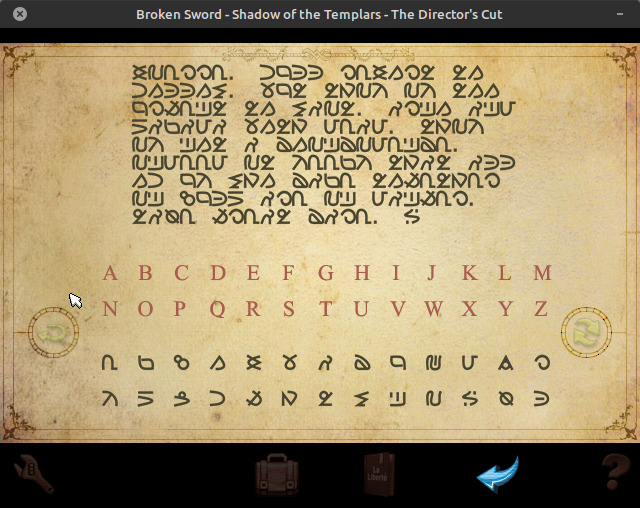Keyboarding the AI apocalypse
At this moment, I’m listening to Episode 452 of The Lex Fridman Podcast while trying to solve the cipher puzzle from Broken Sword: Shadow of the Templars and appreciating the comfort of typing on my simple thrift-store keyboard. I’m trying out a new keyboard shorcut I’ve implemented in my Linux Mint system for typing those troublesome curly apostrophes. The fluency of typing words is one of my simple comforts. It’s a strange contrast to the strenuous, awkward inefficiency of ever doing anything sensible with those words, of making any kind of connection between the free flow of thoughts and the tyrrany of the ticking clock. I consulted the AI language model Claude for ideas about how to implement my apostrophe shortcut even as in my personal time-stream Dario was explaining to Lex about how Claude had learned how to interact with GUIs by interpolating screencast videos of typical computer tasks.
The fluency of chatting with today’s language models is either a serpant’s apple or a samurai’s sword. Whatever the risks of entrapment within our self-referential delusions, of being guided by the statistical vibe, of experiencing and actualizing dangerous and chaotic fantasies—the intrigue cannot be understated of a tool that can take a brashly typed brain dump and offer statistically reasonable structures to leverage or to embody those ideas. I’m grateful for anything that can pull my spade out of the weeds and show me how to stand in line to pick the fruit. But I don’t think I want anything spoiling my joy in the moment when the message shifts into focus and the meaning of the map reveals the adventure.

“What if things actually go well?” Dario asks,at about timestamp 1:59:46, according to the transcript justifiably pointing out that the anthropological impact of AI has been commonly enough predicted to be very bad. For at least as long as the field of information theory has held opened the floodgates of the overflowing information river, science fiction has been decrying the inevitable day—once abstract and fanciful, now casting a shadow upon the threshhold—when apparently sentient machines would displace humanity.
The leading example from one of the foundational works of early science fictionErewhon, by Samuel Butler, 1872. For example, see “The Softer Side of Dune“ by Kara Kennedy of dunescholar.com, i.e. p. 15 in the PDF version she provides. I can‘t find any sources to definitively demonstrate that Herbert named the Butlerian Jihad after Samuel Butler, but this seems to be broadly assumed by both the fandom and by academic critics. Butler also wrote an essay comparing the evolution of industrial machinery to Darwinian evolution and concluding that “war to the death should be instantly proclaimed” against machines. likely provided the name for an event in the timeline authored by Frank Herbert for the Dune universe that sets the regressive scene of the recently re-filmed novel.
Thousands of years in Dune’s distant past, digital computers were erradicated in a literal holy war, after which representatives from every religion met on Earth to make an interfaith holy text defining true human nature as a lack of reliance on machine logic:
“Why do you test for humans?” he asked.
“To set you free.”
“Free?”
“Once, men turned their thinking over to machines in the hope that this would set them free. But that only permitted other men with machines to enslave them.”
“‘Thou shalt not make a machine in the likeness of a man’s mind,’” Paul quoted.
“Right out of the Butlerian Jihad and the Orange Catholic Bible,” she said.
The next line in the dialog has the Reverend Mother demonstrate that the heart of this religious prohibition lies in the uniqueness of the human mind. So in Dune we get a portrayal of a future civilization premised on the psychic development of pure human potential, where all the stages of human history as we know it are mixted together and technological advancements are possible but sporadic and unrelated.
Herbert’s peer and critic, J.R.R. Tolkien, joined him in the literary antipathy toward technology, pining for the natural authenticity of pre-modern times.
In ‘On Fairy Stories,’ his theory and craft essay about fantasy as an art form, Tolkien defends the desire to withdraw from modernity. He references observations from his contemporaries lauding the material, visible industrialization of institutions, expressing his indignation of the idea that industrial progress is more real than the natural world or archetypal social concepts enshrined in language and mythology.“The notion that motor-cars are more Tolkien and Herbert seemed to have shared an appreciation for the natural sciencesIn an endnote to 'On Fairy Stories' Tolkien seems to be defending himself against anticipated or extant accusations of being anti scientific: , as well as skepticism toward technological progress; my vague intuition regarding their differences and Tolkien's stated dislike of Dune is that they perceived the great monolithic structures of traditional human meaning differently. Both authors created enormous mythic narratives showing the human story play out against their differing portrayals of fundametal natural wonder, a scene in which the characterization of artificiality is shown in Tolkien as a mythological evil and in Herbert as a failed political system. During my lifetime I observed the cultural influence of The Lord of the Rings as an element of an anti-modern and sometimes anti-technological pushback against the transformations of digital society, while today the Dune duology directed by Denis Villeneuve is crashing over pop culture alongside the generative AI wave, arming social media AI critics with the concept of the Butlerian Jihad just as science fiction fans have begun to experience the long portrayed ideal of conversing with computers.
If anything, compared to the stark, human-centered but impersonal universe of Dune, the animated (if not necessarily animate), personable (if not necessarily personality) language models that we play with today would be more at home in Tokien’s world of spirits, anamalous and aloof personalities (Tom Bombadil), and even sentient beings created by other sentient beings based on the model of a primary creation.The race of Dwarves, created by an archangel or god, Aulë, The categories in which technologies can facilitate greater efficacy have changed and broadended since Tolkien’s day. Tolkien upheld the capability of fantasy as an art to provide escape not only from the rigid world of modern industry but also from the limitations preventing us from experiencing basic fantastical longings. One of these is “the desire to converse with other living things.” (Tolkien 2011, p. 66) Obviously, the basic form and usage of AI language models is at least highly relevant to this essential anthropological desire. But before I make the leap to declare Tolkien to be the accidentally progressive visionary compared to Herbert’s dry and static projection, let’s recall the Reverend Mother’s concession. At the beginning of Dune, the character exemplifying the wisdom of true neutrality says she believes the real commandment against AI should merely forbit attempts to “conterfeit” the human mind. While I can’t imagine the ethicists of that far-future galactic empire approving of an incomprehensible simulation able to function conversationally in any context, it is clear that both Herbert and Tolkien developed literary worldviews with advanced critiques of progressive futurism while also showing the human desire to experience and to express powerful subjective realities. (I’ve heard that the sequel novels also contain a theme of a cautious critique of the society’s prohibition on computing, but all I’ve yet read of Herbert is Dune.)

In the second of the two space opera television shows to bear the name Battlestar Galactica (2004 through 2009), the human society in conflict with the AI threat developed a law against networked computing, though not against all use and manufacture of computers. One consequence of such a social policy is the outlawing of the Internet and the effectual banning of any grass-roots networking endeavors. Appreciating home computing while deploring the Internet is doubly ironic on social media. There are certainly criticisms of the new generative AI from all quarters, including from those who think the general conversational or deep learning capabilities are indicators of a line that we should never have crossed. Of course, there have always been people for whom the line is drawn with computing, or even further back in the development of infrastructure.
If I were the Emperor of the Galaxy and I wanted to safeguard the nature of humanity as conventionally understood against the existential threats and crises of meaning brought on by the digital simulacrum, I would ban neither computers nor the Internet nor generative AI. Instead, the thing against which I would declare holy war is the self-referencial tendency encouraged by mediated postmodernity.Probably a strong sense of Art and Fantasy, as Tolkien thought of the concepts, are necessary to avoid some of the personal gangers of using large language models and generative AI. If I were a prophet of a new moral order in an epic science fiction novel, I would preach the supremacy of proactive grateful choice against the tidal wave of possibilities that tempt us to overthink, over-share, and second guess. I would acknowledge that we are inevitaly swept up in the tide of endless information as a condition of our postmodern existence, without hiding behind this realization so as to avoid the higher callings of existential self-mastery and epistemological honesty, without using it as an excuse for not living an authentic and and disciplined life. Nothing may be necessary, nothing may be real, but I can make the choice not to counterfeit my own life.
It’s the second day since the moment when I typed the first paragraph of this blog post, when I had just started listening to the podcast episode, and I haven’t managed to finish either the episode or the blog post, although Lex has finished talking to Dario and now has two of Dario’s companions from Anthropic lined up. This blog post was really written with the purpose of providing a case utilizing lots of side notes, margin notes, captioned images, and quotations so that I could test and fully implement the design of these features from the Tufte CSS stylesheet that I’m using on the current blog, giving me something to work with in order to tweak the theme and templating to support the HTML structure needed by the stylesheet for these features. But I try not to let my hypocrisy get in the way of sincerity.
I agree with Dario that meaning is made by choiceApprox. timestamp 02:32:56, according to the transcript and deliberate application, whether or not whatever one chooses to do has been done before or can be done better or more efficiently. It’s Thanksgiving. I give thanks for the deep roots of diverse and universal cultural values that I’ve seen and applied, and for the world and kinds of worlds that have intersected with my 33 years of experience, for the objective seeds of ideas that fate has allowed me to authentically incorporate by free will.
I’m not sure what to do next, but I think a reasonable choice is to keep on typing.